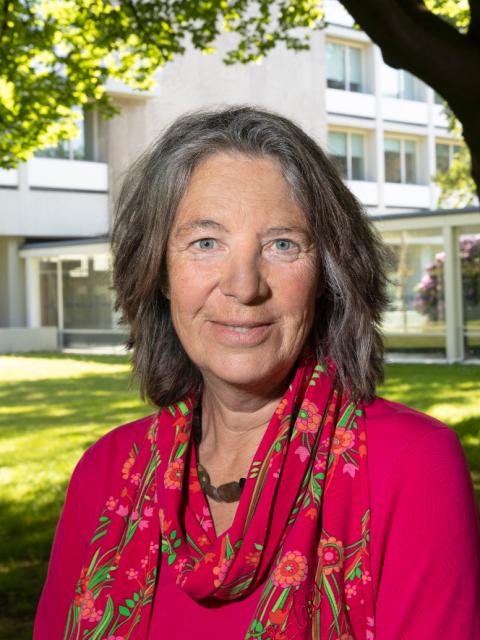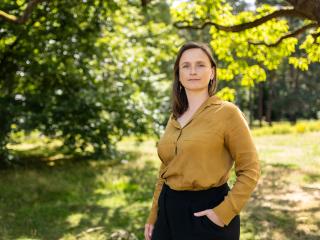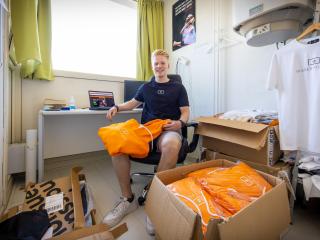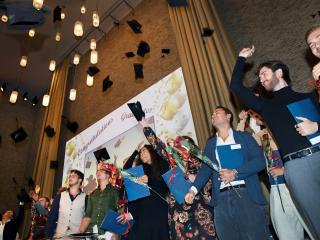Corien Prins: Impact does not happen by itself. It requires essential competencies
On October 4, 2023, Professor of Law and Information Technology Corien Prins officially received the NWO Stevin Prize in The Hague. She has known that she was the recipient since June but she is still slightly bewildered – but also very pleased for the Law School and the university. The prize, to the amount of € 1.5 million, was awarded in recognition of her contribution to the development of law and (information) technology as well as to the policymaking in that field, among other things, in her capacity as the Chair of the Netherlands Scientific Council for Government Policy (WRR). Plans on how to use the prize are now on paper: three initiatives to improve the experience with and insight into science-informed government policymaking. It's about being able to step out of your own world into the world of the other, Prins argues. An interview.
Why is interaction between science, politics, and policy so important?
“I have always been proud of science. I think that we have an incredible amount of wonderful and important knowledge at our disposal. We should put it to better use than merely propagating that knowledge in the academic world. We are publicly funded, so a wider audience should benefit from it. However, it gradually dawned on me as a government advisor in The Hague that it is very complicated for politicians to actually tap into academic knowledge. First of all, they need to be aware that the knowledge is available, and then they have to also understand it well to be able to benefit from it. For scientists, on the other hand, it is difficult to get politicians to embrace their knowledge, and to also be able to say: this is as far as science goes and what comes next are the political choices. What I want to do with the Stevin Prize is strengthen these competencies, those of scientists as well as those of policymakers and politicians.”

If we were to work on competencies, that knowledge would have more added value for politics and policy
Is something not right in the relationship between science and politics then?
“It is not so much that the relationship is not good but a lot of knowledge is not tapped into. If we were to work on competencies, that knowledge would have more added value for politics and policy. That is relevant, for instance, where long-term policy is concerned. Across the board, we scientists are used to taking the long-term perspective. In my own field: if you regulate in a way that is too technology-dependent, only for the specific use of drones, for instance, your work is never done. The long-term angle is our added value. But we need to think carefully how best we can transfer this perspective in a politically charged world that is mainly interested in the short term.”
How do you want to bring about change?
“When you read about initiatives to strengthen the interaction between science on the one hand and policy, politics, or parliament on the other, they are mainly about organizing things. For instance, a National Expert Centre for Science and Society is being set up by order of the Dutch Minister of Education to improve science communication, we have the Parliament and Science partnership to build bridges between the two. What I do not want is yet another organization, I want better competencies. At the university, we’d like to have a positive impact, but impact does not happen by itself. It requires essential competencies, on the science side as well as on the policy side.”
How do you want to strengthen these competencies?
“One of the three ways in which I want to achieve them is tapping into experience. In The Hague, there are various advisory bodies that provide the government with evidence-based advice. They include the Netherlands Scientific Council for Government Policy (WRR), the Health Council of the Netherlands (Gezondheidsraad), the Dutch Education Council (Onderwijsraad), and the Dutch Advisory Council for Science, Technology and Innovation. Providing advice to the government is in their DNA, but not necessarily in that of scientists. I want to make the experience of these advisory bodies available to scientists.”
The interaction between policymakers must be in dialogues, not merely learning and sending information. You need to speak the same language
Science advisory fellowships
“So first of all, I want to give recent PhD graduates, two every year, the opportunity to gain experience for six months as a fellow at an advisory council or at the Analysis and Research Department (DAO) of the Netherlands House of Representatives, modeled on the POST fellowships at the UK parliament. That will allow them to experience the world of politics and policy first hand. They will get the opportunity to gain experience in giving advice, but also to stand firm so they are able to clearly state where their knowledge ends and politics begins. In dialogues with policymakers, these fellows in their turn can show how science works. That interaction must be in dialogues, not merely learning and sending information. You need to speak the same language.”
Training as a science advisor
“The second plan is to set up an educational program that focuses on teaching competencies to conduct that dialogue. This program is aimed at scientists as well as policymakers and politicians. The scientists who worked as fellows in The Hague can participate here as instructors. I am also going to involve the training program of the European Commission. The focus of the first two initiatives will initially be on law, but if they are successful, I would like to branch out to more disciplines.”
We scientists provide our advice, for instance, through reports by Research and Documentation Centre WODC, the knowledge center in the field of the Dutch Ministry of Justice and Security. But we hardly ever monitor whether and how the advice actually informs policy.
Study on political ‘trade-off’
“The third plan is in my own field: the regulation of technological innovation, because we know not nearly enough about ways in which policy and politics can practically profit from science where the regulation of technology is concerned. We scientists provide our advice, for instance, through reports by Research and Documentation Centre WODC, the knowledge center in the field of the Dutch Ministry of Justice and Security. But we hardly ever monitor whether and how the advice actually informs policy. What recommendations are adopted as policy and which aren’t? And why exactly? What is the right moment to introduce academic knowledge? When the political choices are made, there is always a kind of trade-off of various economic, political, legal, and other interests: the late Ig Snellen, who used to be Professor at our Law School, named them ‘rationalities’. The project is aimed to get a clearer picture of that trade-off by means of research.”
You keep emphasizing that scientists and politicians should enter into a dialogue. Why is that?
“In a dialogue, you can discover a shared language. That may sound simple, but in practice it is quite complicated. In the WRR’s most successful report, Weten is nog geen doen [Knowing isn’t necessarily doing], the role of people’s cognitive skills in executing government policy is discussed. For instance, students were aware that they had to sign out of their free public transport chip card with Education Executive Agency DUO after graduation, but many failed to do so. We told the government: ‘Put yourself in your citizens’ shoes. Consider whether a policy is feasible for citizens.’ In sum, take their ability to take appropriate action into account. We have coined the Dutch term doenvermogen to avoid difficult academic terms to explain what is happening in the brain -- and it is now in the Dutch Dikke Van Dale dictionary.”
“It is important to have the ability to speak a different language and the creativeness to make academic language clear and understandable for people without expert knowledge. You have to be able to step out of your own world. This applies to policymakers and politicians as well: they have to be able to ask a scientist the right questions.”
Recognition & Rewards is crucial, but it is a legitimate wish that things have been well thought out
Tilburg University is a university focusing on the Humanities and Social Sciences. To me that seems to be a good starting point to these three initiatives.
“Absolutely. For a start, with TILT (the Tilburg Institute for Law, Technology and Society, set up by Corien Prins, ed.), we have an internationally renowned research institute. Two: we were only able to achieve this because we are a university with a focus precisely on the socio-academic side, law and ethics, that is, the Humanities. The recent attention that has been paid to ChatGPT shows how crucial that side of things is to be able to jointly state: this is where we draw the line, or: we will continue only under these conditions. Purely technical knowledge will not get you anywhere. It is necessary, of course, but you cannot do without us. Even at TILT, we can still learn because we are very internationally oriented and our academic insights are still underexposed in The Hague.”
The interaction between science and public policy could also be addressed in the Recognition & Rewards project at Dutch universities, aimed to better reward ‘outreaching’ and impact activities. Are you a fan?
“What I don’t want to happen is people raising their hand and claiming they are knowledgeable on the subject, and who then engage in ad hoc outreach and impact. Recognition & Rewards is crucial, but it is a legitimate wish that things have been well thought out. What do you want to achieve in society and why? Making impact needs to be just as evidence-based as academic work.”
See also:
NWO Stevin Prize laureate 2023 - Corien Prins
Date of publication: 5 October 2023



